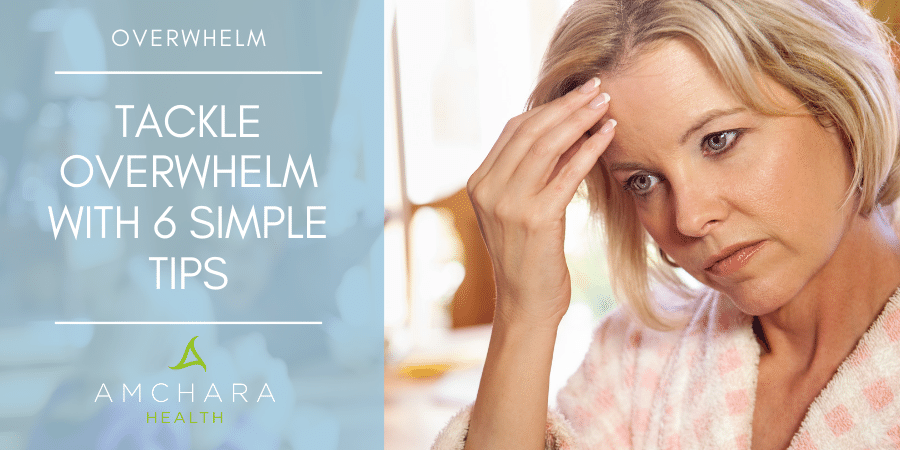Topics Covered in this article:
Stress is caused by a variety of factors and surveys show that 74% of the population have felt so stressed they have been overwhelmed or unable to cope. The feeling of overwhelm can cause anxiety, panic attacks and depression as well as a myriad of physical symptoms.
It can often feel hard to escape stressors and they may build up. We always take an evidence-based approach and aim to provide you with actionable knowledge and tips to help you on your journey to optimal health; in this article we take a look at what happens in overwhelm and reveal 6 ways to deal with it.
Overwhelm explained
Stress can be defined as challenges that are put on the body and can involve many factors. Stress may be from physical stress like intense exercise, injuries, illness or extremes in environmental temperatures. Psychological stress may be caused by work or life pressures, negative emotions, a lack of social contact or trouble with relationships.
Nutrient deficiencies, chemicals, toxins and even environmental factors like electromagnetic fields and blue light emitting devices also place stress upon the body. It is easy to see how these challenges can add up.
The body is well equipped to deal with day to day challenges and the adrenal glands release several hormones to prepare the body for ‘fight or flight’. This was a vital response for our ancestors and helped to keep them safe; the problem with modern society is that the stress response can become chronically activated.
Like all things that are over used, there comes a point when enough is enough. This is the state of overwhelm.
Signs of overwhelm
There are a vast number of signs and symptoms of overwhelm and these can vary for each individual. The biggest indicator that overwhelm has been reached is the feeling that you have no control and cannot take any more – often the straw that breaks the camel’s back is a small one.
This can lead to feelings of anxiety, panic, anger, irritability, frustration, guilt and mood and motivation are impacted. Overwhelm can leave you feeling upset at the smallest of things. Physical symptoms like heart palpitations, headaches, shaky hands and muscle tension may also be common.
The big question is – how can you combat overwhelm effectively?
Top tips:
1. STOP
As soon as you feel overwhelmed STOP and think. Close your eyes, move position or take yourself out of the environment. Don’t keep trying to battle with whatever you are trying to achieve. Find somewhere quiet and take a few slow breaths with an emphasis on a long exhale. Changing your breathing patterns can turn on the calming side of your nervous system, involved in the stress response (1). It may help to think of a time or place when you did feel in control, happy or loved. This may trigger the release of feel good hormones.
2. Accept your feelings
Accepting your feelings rather than questioning, analysing or going over them prevents rumination. Rumination is a leading contributor to stress and occurs when when you are focusing on the negative situation rather than a positive solution.
Yes, you may be feeling anxious or irritable, don’t try to work out why. Ask yourself – “In what way is this feeling or thought helpful?”. You may not be surprised to find the answer is “it isn’t helpful”. Once you have established this – let it go.
This is where visualisation may come in. Closing your eyes and seeing the thought or emotion in a bubble or box can enable you to watch it in your mind’s eye, floating away in the bubble or being packaged up in the box. The more you use these visualisations the easier and more effective it becomes.
3. Focus on the here and now
Stop trying to live in the future and worrying over what you need to do. This tends to leave to creating negative thoughts like “how will I ever get it done?” or “I am a failure if I can’t get everything done”.
Instead, look at what needs attention right now. What is the most important thing that requires your attention? Mindfulness is a great way to help you live in the here and now and regular sessions, such as 10-25 minutes once or twice a day can give significant improvements on stress levels (2).
4. Ditch your digital devices
In this modern world there is an increasing sense of feeling you have to be ‘available’ 24/7. The rise in use of digital devices like smartphones or tablets and social media platforms means it is easier than ever to reach out to someone with a ‘quick message’. The constant notification alerts or audible pings that come from these devices can be distracting. How many times have you heard several pings one after the other and thought “go away”? The obligation to respond to messages can in itself be overwhelming and adds more to your mental load.
If you are in the midst of feeling overwhelmed, turn off your notifications or even better turn the device off. Only go back to the device when you feel you have become more on top of things. If you have several messages to respond to, prioritise them and tackle only the three most important ones. An option could be to compose one message and send it to everyone, explaining you are currently dealing with something and you will respond in your own time.
A regular digital detox gives your mind a break and allows you to spend time on more beneficial, nourishing activities. Set boundaries and only use devices at certain times of day. One useful tip is to avoid using them in the evening as the blue light emitted from smartphones, tablets, eBook readers and TVs reduces the production of the sleep hormone melatonin (3) and poor sleep wreaks havoc with stress levels and emotions.
5. Learn to say no
Does saying no make you feel guilty? Do you always feel obliged to say yes? Do you use OK and maybe instead of just saying no?
Certain personality types are predisposed to the effects of stress and overwhelm – this includes those with a strong sense of duty. It is important to remind yourself that saying no does not mean you are being difficult or unhelpful. You cannot please everyone and being assertive and saying no can allow you to take control of your own priorities.
Of course, a blunt no may not always go down well but remember you do not need to justify why you are saying no. Think about offering an alternative suggestion that suits you or suggest another time or person to help.
6. Make a cup of tea
A somewhat simplistic, and perhaps rather British, suggestion but taking time to make a cup of tea can help you pause the vicious circle. The physical actions involved in removing yourself from your situation and putting the kettle on can break rumination. Drinking a good cup of tea is comforting and warming. Tea itself contains many beneficial compounds, some of which are thought to help combat stress hormones and calm the stress response (4).
Green tea is particularly rich in an amino acid called theanine, shown to increase alpha waves in the brain, normally seen in deep states of relaxation (5).
Takeaway
Taking these simple steps may help to break the cycle of overwhelm, but long term steps to prevent stress building up can ensure you do not reach overwhelm. Regular physical exercise, nourishing self-care activities, a good night’s sleep and a healthy balanced diet all reduce the impact of stress.
If you feel like you would like to tackle your stress concerns and optimise your health, a consultation with a Personalised Health practitioner can highlight factors that are playing a role in your mental and physical health.
We’re dedicated to providing you with both insightful information and evidence-based content.
Did you find this article useful?
We’d love to hear your thoughts, get in touch!
Read this next:




